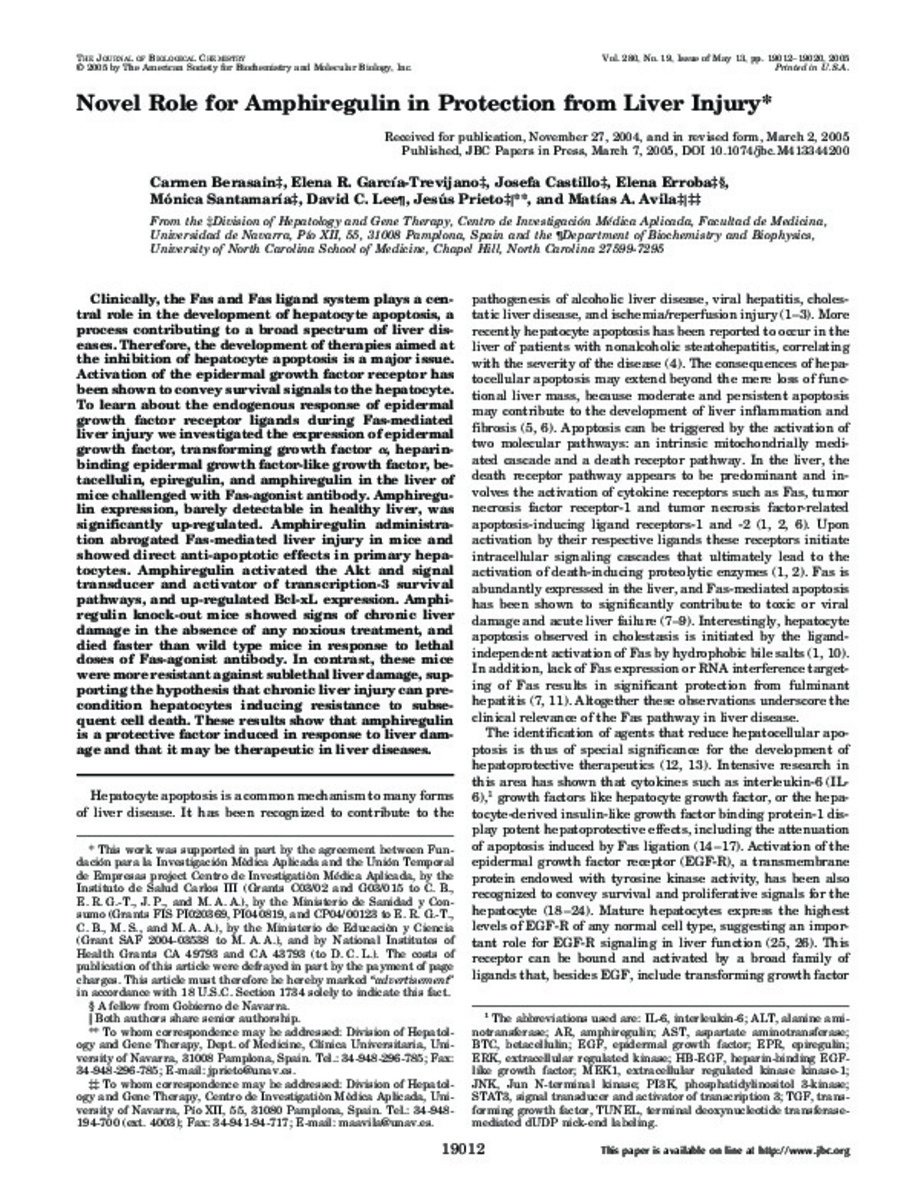Full metadata record
| DC Field | Value | Language |
|---|---|---|
| dc.creator | Berasain, C. (Carmen) | - |
| dc.creator | Ruiz Garcia-Trevijano, E. (Elena) | - |
| dc.creator | Castillo, J. (Josefa) | - |
| dc.creator | Erroba, E. (Elena) | - |
| dc.creator | Santamaria, M. (Mónica) | - |
| dc.creator | Lee, D.C. (David C.) | - |
| dc.creator | Prieto, J. (Jesús) | - |
| dc.creator | Avila, M.A. (Matías Antonio) | - |
| dc.date.accessioned | 2012-09-28T08:30:40Z | - |
| dc.date.available | 2012-09-28T08:30:40Z | - |
| dc.date.issued | 2005 | - |
| dc.identifier.citation | Berasain C, Garcia-Trevijano ER, Castillo J, Erroba E, Santamaria M, Lee DC, et al. Novel role for amphiregulin in protection from liver injury. J Biol Chem 2005 May 13;280(19):19012-19020. | es_ES |
| dc.identifier.issn | 1083-351X | - |
| dc.identifier.uri | https://hdl.handle.net/10171/23255 | - |
| dc.description.abstract | Clinically, the Fas and Fas ligand system plays a central role in the development of hepatocyte apoptosis, a process contributing to a broad spectrum of liver diseases. Therefore, the development of therapies aimed at the inhibition of hepatocyte apoptosis is a major issue. Activation of the epidermal growth factor receptor has been shown to convey survival signals to the hepatocyte. To learn about the endogenous response of epidermal growth factor receptor ligands during Fas-mediated liver injury we investigated the expression of epidermal growth factor, transforming growth factor alpha, heparin-binding epidermal growth factor-like growth factor, betacellulin, epiregulin, and amphiregulin in the liver of mice challenged with Fas-agonist antibody. Amphiregulin expression, barely detectable in healthy liver, was significantly up-regulated. Amphiregulin administration abrogated Fas-mediated liver injury in mice and showed direct anti-apoptotic effects in primary hepatocytes. Amphiregulin activated the Akt and signal transducer and activator of transcription-3 survival pathways, and up-regulated Bcl-xL expression. Amphiregulin knock-out mice showed signs of chronic liver damage in the absence of any noxious treatment, and died faster than wild type mice in response to lethal doses of Fas-agonist antibody. In contrast, these mice were more resistant against sublethal liver damage, supporting the hypothesis that chronic liver injury can precondition hepatocytes inducing resistance to subsequent cell death. These results show that amphiregulin is a protective factor induced in response to liver damage and that it may be therapeutic in liver diseases. | es_ES |
| dc.language.iso | eng | es_ES |
| dc.publisher | American Society for Biochemistry and Molecular Biology | es_ES |
| dc.rights | info:eu-repo/semantics/openAccess | es_ES |
| dc.subject | Glycoproteins/physiology | es_ES |
| dc.subject | Intercellular Signaling Peptides and Proteins/physiology | es_ES |
| dc.subject | Liver/injuries | es_ES |
| dc.subject | Liver/pathology | es_ES |
| dc.title | Novel role for amphiregulin in protection from liver injury | es_ES |
| dc.type | info:eu-repo/semantics/article | es_ES |
| dc.relation.publisherversion | http://www.jbc.org/content/280/19/19012 | es_ES |
| dc.type.driver | info:eu-repo/semantics/article | es_ES |
Files in This Item:
Statistics and impact
Items in Dadun are protected by copyright, with all rights reserved, unless otherwise indicated.






